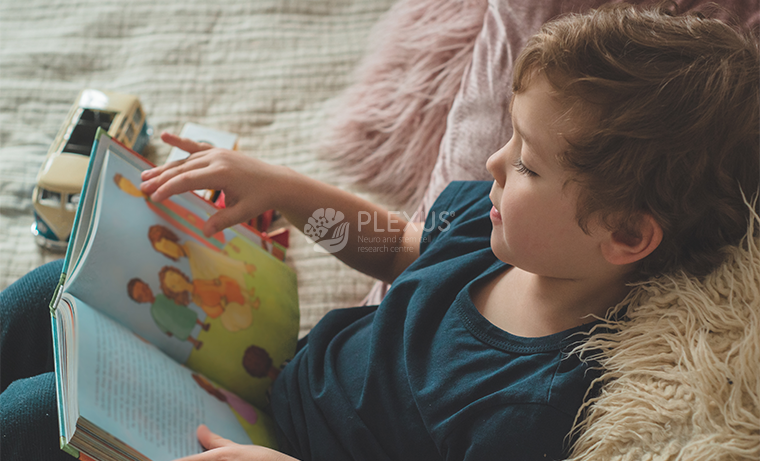
Master ‘A’, a three year old child with Autism enrolled into the Plexus Intensive Rehab Program on 21.01.17 with the characteristic features of autism such as hyperactivity, aggressiveness, no eye contact, typical toe walking, frequent falls, poor response to name call and following of commands. He exhibited severe sensory system related issues such as tactile hypersensitivity, proprioceptive seeking behaviors and vestibular defensiveness. With respect to speech, he used to babble, make some sounds. Also, he displayed inappropriate ways of expressing excitement/ anger and engaged in non-purposeful play.
A holistic approach was initiated to target various aspects for an overall development. This approach targeted the underlying neurological system as well as the skills and behaviours that were super imposed on it. Occupational therapy treatment, which formed the crux of the intervention was focused on developing the gross motor skills, fine motor skills, socio-emotional and academic abilities, dealing with sensory issues, facilitating active participation in daily activities and play with peers.
Play based therapy was used as an important tool to allow the child familiarize himself to his new surroundings. He was allowed to explore the environment freely rather than forcing him to perform therapeutic activities. Creating a strong trustworthy therapeutic rapport with the child was a major goal. Gradually, as the child became comfortable, rigorous therapies were started. A complete sensory program was created for the child. Various techniques such as deep joint compression, neutral warmth, calming activities and use of physical activities were carried out to decrease hyperactivity and aggression. Sensory based play activities were used extensively to handle the various sensory concerns. Behavioral strategies such as use of reinforcers, time-outs were used extensively to curb temper tantrums.
Gradually, amazing changes were observed in the child. The first major change appreciated by the parents were that he is no longer aggressive and hyperactive. As the occupational therapy program progressed, the child demonstrated various improvements in every aspect. He became competent in most of the gross motor activities such as jumping, climbing stairs, running, balancing self on various surfaces. The sensory issues of the child comparatively resolved. He developed increased tolerance levels while having a haircut, brushing feet during bath. Reduction in oro-motor issues such as biting hard textures (books), shirt.
He demonstrated great development in the socio-emotional aspect of his personality. He is able to recognize, understand and express emotions (non-verbally) to parents /therapist. He attempts to interact with adults (parents, therapists) non verbally on most occasions. The child actively began exploring his environment through play. The paradigm shifted from non-purposeful to engaging in purposeful play. According to Parten’s stages of play, master ‘A’ shifted from unoccupied play (initial) to parallel play. He initiates playing ‘catch me’ with elders.
During mid-way of the program, the parents were encouraged to enroll the child in a normal school. This gave the child a regular routine, opportunities to interact with age mates and a feeling of ‘normalcy’. He gradually enjoyed attending school, interacts with age mates by singing nursery rhymes, taking part in competitions (running race), in various school activities. This was seen as an achievement as well as paved way for further socio-emotional development of the child.
He displayed great improvement in the cognitive domain too. He understands basic concepts of ‘up’, ‘down’, ‘under’ etc. He is able to identify, name shapes, colors, vegetables, fruits, alphabets (A-Z), numbers, body parts. He performs action rhymes well. Academically, he performs extremely well as mentioned by his school teachers. He actively participates in activities of daily living such as bathing, dressing, eating.
Master ‘A’s’ journey that culminated in him attending a ‘normal’ school was nothing short of a victory for his parents, Dr. Na’eem Sadiq and the occupational therapists.










